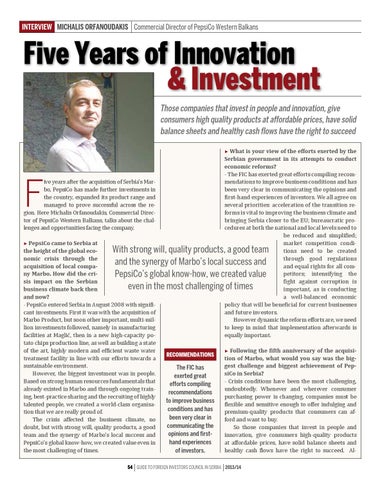Interview Michalis Orfanoudakis Commercial Director of PepsiCo Western Balkans
Five Years of Innovation & Investment Those companies that invest in people and innovation, give consumers high quality products at affordable prices, have solid balance sheets and healthy cash flows have the right to succeed
F
ive years after the acquisition of Serbia’s Marbo, PepsiCo has made further investments in the country, expanded its product range and managed to prove successful across the region. Here Michalis Orfanoudakis, Commercial Director of PepsiCo Western Balkans, talks about the challenges and opportunities facing the company.
► PepsiCo came to Serbia at the height of the global economic crisis through the acquisition of local company Marbo. How did the crisis impact on the Serbian business climate back then and now? - PepsiCo entered Serbia in August 2008 with significant investments. First it was with the acquisition of Marbo Product, but soon other important, multi-million investments followed, namely in manufacturing facilities at Maglić, then in a new high-capacity potato chips production line, as well as building a state of the art, highly modern and efficient waste water treatment facility in line with our efforts towards a sustainable environment. However, the biggest investment was in people. Based on strong human resources fundamentals that already existed in Marbo and through ongoing training, best-practice sharing and the recruiting of highly talented people, we created a world-class organisation that we are really proud of. The crisis affected the business climate, no doubt, but with strong will, quality products, a good team and the synergy of Marbo’s local success and PepsiCo’s global know-how, we created value even in the most challenging of times.
► What is your view of the efforts exerted by the Serbian government in its attempts to conduct economic reforms? - The FIC has exerted great efforts compiling recommendations to improve business conditions and has been very clear in communicating the opinions and first-hand experiences of investors. We all agree on several priorities: acceleration of the transition reforms is vital to improving the business climate and bringing Serbia closer to the EU; bureaucratic procedures at both the national and local levels need to be reduced and simplified; market competition conditions need to be created through good regulations and equal rights for all competitors; intensifying the fight against corruption is important, as is conducting a well-balanced economic policy that will be beneficial for current businesses and future investors. However dynamic the reform efforts are, we need to keep in mind that implementation afterwards is equally important.
With strong will, quality products, a good team and the synergy of Marbo’s local success and PepsiCo’s global know-how, we created value even in the most challenging of times
recommendations
The FIC has exerted great efforts compiling recommendations to improve business conditions and has been very clear in communicating the opinions and firsthand experiences of investors.
Following the fifth anniversary of the acquisition of Marbo, what would you say was the biggest challenge and biggest achievement of PepsiCo in Serbia? - Crisis conditions have been the most challenging, undoubtedly. Whenever and wherever consumer purchasing power is changing, companies must be flexible and sensitive enough to offer indulging and premium-quality products that consumers can afford and want to buy. So those companies that invest in people and innovation, give consumers high-quality products at affordable prices, have solid balance sheets and healthy cash flows have the right to succeed. Al►
54 Guide to Foreign Investors Council in serbia 2013/14
